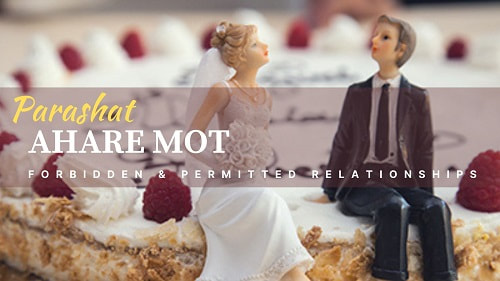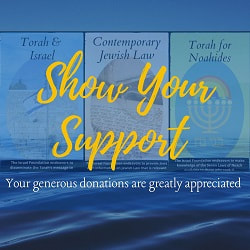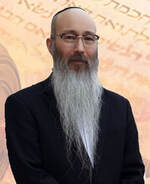|
By: HaRav Menashe Sasson Reporting from Jerusalem, Israel Published in the U.S.A. Parashat Ahare Mot discusses, among other things, the types of relationships which are forbidden and the punishment for engaging in such relationships. The section on forbidden relationships begins with HaShem instructing Moshe Rabbeinu to tell the Jewish people to refrain from engaging in immoral practices which were then prevalent in Misrayim (Egypt), and in Eretz Kena’an (the Land of Israel). Vayyiqra 18:1-3. Speaking to men, HaShem commands, “None of you shall approach to any that is near of kin to him, to uncover her nakedness. I am the Lord.” Vayyiqra 18:6. The relatives with whom a man is forbidden to have a relationship are then listed:
Vayyiqra 18:6-22. Men and women are both prohibited from engaging in relations with animals. Vayyiqra 18:23. These pesukim suggest a number of questions. Perhaps the most obvious is, why are these prohibitions, save for one, directed only to men? As a general rule, the Torah commands beneficial conduct when, in the absence of a command, a large percentage of the population is not likely to engage in such conduct, or where the conduct is especially beneficial. For example, the Torah commands men, but not women, to get married. Bereshit 2:24. The reason, of course, is that men are generally more inclined than women to partake of the physical pleasures of marriage, while at the same time rejecting the obligations of marriage, and because marriage is especially beneficial, both to individuals and to societies. A corollary to this general rule is that the Torah prohibits harmful conduct when, in the absence of a prohibition, a large percentage of the population is likely to engage in such conduct, or where such conduct is especially harmful. Thus, since men are more likely than women to be promiscuous, and because promiscuous behavior is especially harmful – both to individuals and to societies – the Torah prohibits such conduct. Although women are not immune to promiscuous conduct, one need only look at various societies, both past and present, to see that, in general, men are more prone to this type of misbehavior, as compared to women. If we were to give examples, it would relatively easy to compile a long list of men whose careers and personal lives have been ruined, or at least seriously compromised, as a result of such conduct, while a corresponding list of women would be comparatively short. Even though the Torah prohibits certain types of relationships, it encourages, indeed mandates, that men and women get married and, to the extent they are capable of doing so, to have children. “[A] man leaves his father and mother, and cleaves to his wife, and they become one flesh.” Bereshit 2:24. On the sixth day of creation, HaShem said, “Be fruitful and multiply, replenish the earth and subdue it. . . .” Bereshit 1:28. After the Great Flood, HaShem “blessed Noah and his sons and said to them, ‘Be fruitful and multiply, and replenish the earth.’” Bereshit 9:1; 9:7. According to the Talmud, Shimon ben Shetach (c. 140-60 BCE) instituted a requirement that a groom give his bride a marriage contract, a ketubah [כתובה], which literally translated means “written.” T.B. Masekat Shabbat 14b. Perhaps most famously, a ketubah [כתובה] sets forth the husband’s obligation to pay his wife a certain amount of money if he divorces her. Although often emphasized to a lesser degree, a ketubah [כתובה] also articulates a husband’s obligation to provide his wife with three things: 1. Food, 2. Clothing, and 3. Onah [עונה]. Translated literally, “onah” [עונה] means “season.” In the context of a wife’s rights as set forth in her ketubah [כתובה], the term “onah” [עונה] refers to a husband’s obligation to engage in marital relations with his wife. The seeming incongruence between, on the one hand, the prohibitions in Parashat Ahare Mot, which enjoin a man from engaging in relations with certain classes of individuals and, on the other hand, of a husband’s obligation to engage in relations with his wife, deserves some examination. As we previously noted, the purpose of the prohibitions in Parashat Ahare Mot, which are directed almost exclusively at men, seem to imply that men are more likely than women to engage in intimate conduct which is harmful, both on an individual level and on a societal level. Judging from history, we of course know this is quite true. Therefore, we might expect that Halakha (Jewish law) would mandate that a wife engage in marital relations with her husband, so that her husband would be satisfied and, thus, presumably, less likely to seek physical satisfaction from other women. Jewish law, however, is exactly the opposite. Rather than a wife being obligated to provide her husband with physical satisfaction, the husband is required to satisfy his wife’s needs. This conundrum, however, is easily resolved. The source of a husband’s obligation to provide his wife with onah [עונה] is the pasuk, “If he take[s] another wife for himself, her food, clothing, and her duty of marriage shall not [be] diminish[ed].” Shemot 21:10. Therefore, we see that although Parashat Ahare Mot forbids a man from engaging in certain types of relationships, the Torah clearly contemplates that a man might have more than one wife. Indeed, we see in Tanakh many instances of men having more than one wife. Rambam’s Mishneh Torah on this subject is quite detailed and provides, in part, that “[t]he [obligation of] conjugal rights as prescribed by the Torah [is individual in nature and depends] on the strength of each particular man and the [type of] work he performs.” M.T. Hilchot Ishut 14:1. “A wife has the right to prevent her husband from making business trips, except to close places, so that he will not be prevented from fulfilling his conjugal duties. He may make such journeys only with her permission.” M.T. Hilchot Ishut 14:2. Similarly, she has the prerogative of preventing him from changing from one profession which grants her more frequent conjugal rights to a profession that grants her less frequent rights. Id. “A man [has the prerogative of] marrying several wives – even 100 – whether at one time or one after the other. His wife may not object, provided he has the means to provide each [wife] with her subsistence, clothing, and conjugal rights as befits her.” M.T. Hilchot Ishut 14:3. The Shulkhan Arukh (Code of Jewish Law) likewise recognizes a man’s right to take more than one wife.
Shulhan Aruch, Even Ha’ezer 1:9. This was the Halakha until about the year 1000 CE, when Rabbeinu Gershom (c. 960 - 1040, France, Germany) instituted a ban on polygamy. Reasons which have been given for the ban include: Shalom Bayit (peace in the home); the difficulty that some men might have in supporting more than one wife; and as a complement to another of Rabbeinu Gershom’s edicts that a wife, contrary to Torah law, must consent to a divorce. Regarding this last reason, a ban on multiple wives was intended to prevent a man from simply marrying another woman if, in reliance on Rabbeinu Gershom’s “modification” of the Torah, a woman refused to consent to her husband’s request for a divorce. As an initial matter, not only is Rabbeinu Gershom’s ban on polygamy at odds with the permission given by the Torah for a man to take more than one wife, the ban is arguably also at odds with the Torah’s command that Jews and Gentiles alike “be fruitful and multiply.” On the sixth day of creation, HaShem said, “Be fruitful and multiply, replenish the earth and subdue it. . . .” Bereshit 1:28. After the Great Flood, HaShem “blessed Noah and his sons and said to them, ‘Be fruitful and multiply, and replenish the earth.’” Bereshit 9:1; 9:7. Rabbeinu Gershom’s ban on polygamy was intended to remain in effect only until the year 5000 (1240 CE). Id. The Pit’heh Teshuba, in his commentary to the Shulhan Aruch (Code of Jewish Law), explained that Rabbeinu Gershom limited the duration of his enactment in order to avoid violating the prohibition of “Bal Tosif” – adding onto the Torah. Rabbeinu Gershom’s ban on polygamy was not accepted by all Jews. The Rashba (Rav Shlomo Ben Aderet (1235-1310, Barcelona, Spain)) wrote that in Spain and some other regions, the ban was not accepted. This is also the view of Maharam Alshakar (1466-1542). Under Islamic law, a Muslim man may have as many as four wives at the same time. Thus, we see that the Torah allows a man to have more than one wife at a time; the polygamy ban was instituted by a rabbi who lived in a Christian-majority geographic area; the polygamy ban was intended to be temporary, out of concern that a permanent ban would have the effect of altering the Torah; and that the polygamy ban has never been fully accepted by all of the Jewish people. Upon closer examination, we see that the stated reasons for the ban cannot withstand scrutiny. Regarding Shalom Bayit, we see that polygamy has not necessarily led to less Shalom Bayit in cultures where it is or has been practiced, as compared to Christian-majority countries, where polygamy generally is illegal. Quite the contrary; rates for divorce and domestic violence are quite high in many Christian-majority countries. As for the concern that some men might have difficulty supporting more than one wife, although perhaps true, that certainly is not a legitimate basis for a complete ban on polygamy. In no other economic context do was say that because some people cannot afford more than one, all people are limited to one. Furthermore, we see in cultures that are not guided by Torah principles that men often father many children with different women, without marrying any of the women or voluntarily supporting the women, or the children whom they father. Allowing a man to have more than one wife, on the condition that he financially supports her and their children, would certainly be a better social policy. And finally, as many parents have told their child: “two wrongs don’t make a right.” The so-called “temporary” ban, which was not made permanent in the first instance, out of concern about altering the Torah, but which has, de facto, become permanent, cannot be justified on the ground that it complements a different change to the Torah, that is, the change which now requires a wife’s consent for a husband to divorce her. The Torah, in Parashat Ahare Mot, forbids men from engaging in relationships with certain people. However, the Torah, in its wisdom, also permits other relationships which, in the context of Western, Christian culture, are prohibited. As a general matter of Halakhic policy, the Rabbis should not prohibit that which the Torah allows. Thus, because the Torah allows polygamy, the Rabbis should not ban it. Whether anyone should engage in polygamy is an individualized and personal decision, which should be arrived at in a thoughtful, careful, and reasoned manner. As religious, Torah-observant Jews, may we, and the Rabbis who guide us, be blessed to have the faith, trust, and strength to accept all of our Holy Torah, even, and perhaps especially, those parts which we do not fully understand or which we may find to be objectionable to our supposedly “enlightened,” Westernized, Christianized concepts of right and wrong. שבת שלום Shabbat Shalom! Copyright © The Israel Foundation. All Rights Reserved.
0 Comments
Your comment will be posted after it is approved.
Leave a Reply. |
THE ISRAEL FOUNDATION





